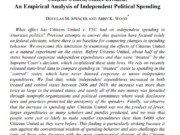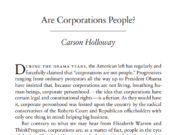Much criticism of the Supreme Court’s decision in Citizens United stems from the claim that the Constitution does not protect corporations because they are not “real” people. While it’s true that corporations aren’t human beings, that truism is constitutionally irrelevant because corporations are formed by individuals as a means of exercising their constitutionally protected rights. When individuals pool their resources and speak under the legal creation of a corporation, they do not lose their rights. In a world where corporations are not entitled to constitutional protections, the police would be free to storm office buildings and seize computers or documents, and the Mayor of New York could exercise eminent domain over Rockefeller Center without compensation. Moreover, the government would be able to censor all corporate speech, including that of so-called “media corporations.” In short, rights-bearing individuals do not forfeit those rights when they associate in groups. In this article, Ilya Shapiro and Caitlin W. McCarthy explain why the common argument that corporations lack rights because they are not people demonstrates a fundamental misunderstanding of both the nature of corporations and the First Amendment.














